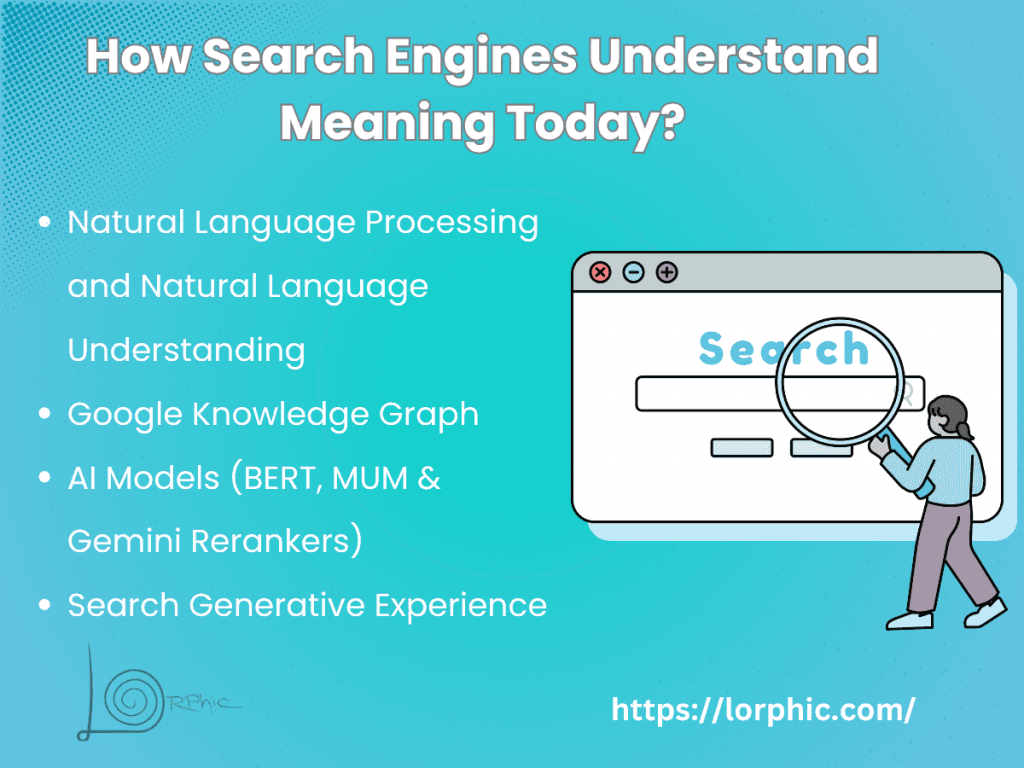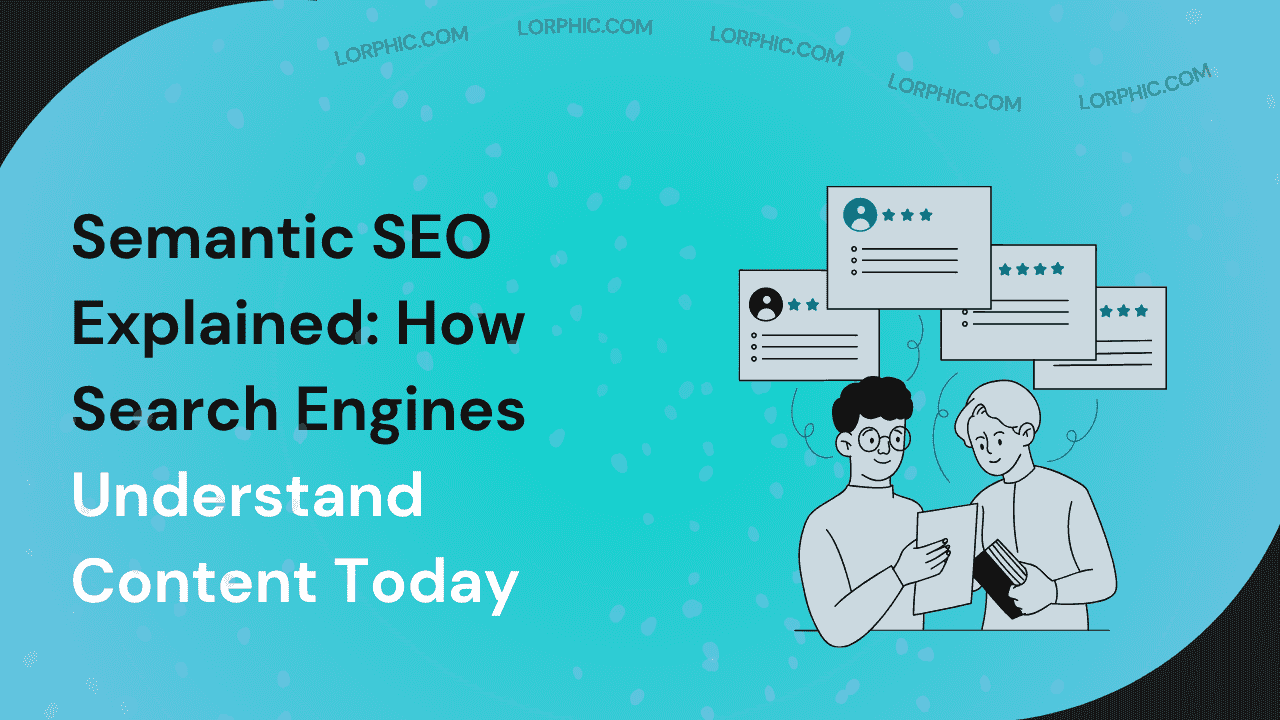Search engines have evolved faster in the last few years than they did in the entire decade before. With Google now using advanced artificial intelligence systems like BERT, MUM, SGE, and real time generative search understanding, ranking is no longer about repeating keywords or matching a search query exactly as it is written. Google has shifted toward understanding the deeper meaning of content, the context behind each topic, and how different ideas connect to each other. This major shift is exactly why semantic SEO matters more than ever.
If you have been trying to understand what is semantic SEO, how it works, or why it is becoming so important in 2025, this guide will walk you through everything in a clear and friendly way.
What is Semantic SEO?
Semantic SEO is a modern approach to optimization that focuses on meaning instead of relying only on individual keywords. Rather than trying to repeat one specific phrase, this method looks at what the user truly wants to know, why they are searching, and how different topics connect to each other.
In simple terms, semantic SEO helps search engines understand the context, the intention behind the query, and the deeper message within your content. It is not about matching exact words. It is about helping Google recognize what your page is genuinely trying to explain.
This approach usually includes:
- Covering all related subtopics.
- Using natural variations of keywords.
- Adding definitions, examples, FAQs, and clear explanations.
- Answering questions based on user intent.
- Connecting related articles with internal links.
- Helping Google recognize important entities and their relationships.
When done correctly, semantic SEO helps your content rank for a wider range of keywords and improves your chances of appearing in the Search Generative Experience.
How Search Engines Understand Meaning Today? (2025 Search Technology)
Search engines in 2025 work in a much smarter way. Instead of looking at single keywords, they now try to understand the real meaning behind a page. According to Search Engine Journal, modern search engines rely on understanding context and relationships, rather than just matching exact keywords, which makes semantic SEO essential.

Natural Language Processing and Natural Language Understanding
Google uses natural language processing and natural language understanding to study how sentences are written and how different words connect. These systems help Google recognize synonyms, relationships, and the intent behind a query. This is why a page that explains how to fix a computer that will not turn on can also appear for searches such as laptop not powering on or computer black screen. Google sees these as the same problem because it understands the meaning, not just the words.
Google Knowledge Graph
The Knowledge Graph is another key part of how Google understands meaning. It stores information about billions of entities such as people, places, brands, and ideas. It also records how these entities relate to each other. This allows Google to answer questions like who created something, where something is located, what its purpose is, or how it connects to something else. When your content fits well within these relationships, Google is more likely to view it as trustworthy and helpful.
AI Models (BERT, MUM & Gemini Rerankers)
Google now uses advanced artificial intelligence models to interpret content on a deeper level. Models like BERT, MUM, and Gemini re-rankers analyze search intent, the depth of a topic, the meaning behind questions, and how relevant each part of your content is. MUM is especially powerful because it can understand complicated subjects across different languages and content formats. This means Google now prefers content that is clear, complete, and full of helpful context.
Search Generative Experience
The Search Generative Experience uses generative artificial intelligence to give users quick answers. To be included in these summaries, your content needs to offer valuable insights, stay closely related to important entities and their relationships, answer different forms of user intent, and provide enough context for AI to pull from. A strong semantic SEO strategy increases your chances of being featured in these AI generated responses and helps your content perform better in modern search.
Why Semantic SEO Matters in 2025?
Semantic SEO has become essential in today’s search landscape. Google now expects content to provide real meaning, complete coverage, and a clear understanding of user intent. This approach helps your website perform better across search results and improves the overall user experience.
Here is why semantic SEO is so important in 2025:
- It helps build strong topical authority because Google prefers websites that explain a subject in a complete and detailed way instead of offering surface level information.
- It allows you to rank for many different keywords at the same time including the main keyword, long tail variations, question based queries, and contextual searches.
- It improves user engagement because meaningful content answers what users truly want to know which leads to better click through rates, longer time on page, and higher conversions.
- It increases your chances of appearing in the Search Generative Experience since content rich in context and meaning is more likely to be included in AI created summaries.
- It strengthens your overall content marketing strategy by helping your pages match both user expectations and search engine requirements which is an important part of the role of semantic SEO in content marketing.
Core Elements of Semantic SEO
To build a successful semantic SEO strategy, your content should include the following essential components:
| Core Element | Description |
| Entity-Based Optimization | Entities are the main nouns on the web such as people, places, concepts, brands, and products. Semantic SEO involves mentioning relevant entities, connecting them logically, linking to authoritative sources, and using structured data to help Google understand your content better. |
| Intent-Focused Content | Every keyword reflects a user’s intent, whether it is informational to learn something, transactional to buy something, navigational to find something, or comparative to evaluate options. Semantic SEO tailors content to match these motivations. |
| Semantic Keywords and Contextual Terms | These are phrases and terms that relate to the main topic and provide meaningful context. They help Google understand the depth of your content, its relevance to your target keywords, and how different concepts connect. This shows why semantic keywords are important in SEO. |
| Structured Data (Schema Markup) | Schema markup helps search engines interpret the context of your content more accurately. Using structured data can improve your chances of appearing in rich results and being included in AI-driven search summaries. |
| Internal Linking Strategy | Linking between related topics, subtopics, pillar pages, and FAQ articles creates a semantic content network. This strengthens your topical authority and guides search engines through the hierarchy of your content. |
Tools That Help You Do Semantic SEO Effectively
Using the right tools can make semantic SEO much easier and more effective. Here are some top options:
Semrush: A comprehensive SEO platform that helps you identify semantic keywords, analyze competitors, and track how your content ranks for different search intents.
ClearScope: Focuses on content relevance and depth by suggesting related terms and topics to make your content more comprehensive and aligned with user intent.
Ubersuggest: A user-friendly tool for discovering keyword ideas, search volume, and content opportunities that cover a range of related topics and queries.
Answer The Public: Provides insight into the questions and queries people are actually searching for, helping you create content that directly matches user intent.
NeuronWriter: Assists in content optimization by analyzing top ranking pages, suggesting semantic keywords, and ensuring your content covers all relevant subtopics for better search visibility.
Future of Semantic SEO: What’s Coming Next?
The future of semantic SEO is closely tied to advances in AI and the way Google understands content. AI-driven search experiences are becoming the norm, and content that is semantically optimized will have a higher chance of appearing in AI-generated summaries. This means websites that focus on meaning, context, and comprehensive coverage will stand out more in search results.
Entity-first search is another major trend. Google is increasingly prioritizing content that clearly identifies and explains entities such as people, places, products, and concepts, and shows how they relate to each other. Content that is rich in context and organized around these entities is more likely to gain authority and visibility.
Zero-click results are also on the rise. AI-powered answers, rich snippets, and other instant search features may reduce traditional clicks on organic results. This makes it even more important for content to provide clear, useful, and in-depth information that can be featured directly in search results.
Google is also placing more emphasis on experience-based content signals. This includes evaluating how helpful content is, the use of examples and case studies, and the inclusion of unique insights that go beyond generic explanations.
Finally, conversational search is becoming more common. Users are now searching in longer, natural language phrases rather than short keywords. Semantic SEO allows you to capture these queries effectively by understanding intent and context, ensuring your content meets user needs now and in the AI-powered search era.
Conclusion
Semantic SEO is now the foundation of modern search optimization. Instead of focusing only on keywords, it emphasizes context, intent, and meaningful connections within your content.
This approach helps your content rank higher, cover topics more thoroughly, and build genuine authority that Google recognizes. It ensures your content is easy for search engines to understand and, more importantly, useful for your audience. By providing clear, relevant, and helpful information, your content can truly meet user needs while gaining visibility in search results.
Adopting semantic SEO sets your website up for long-term success in 2025 and beyond, creating content that works for both users and search engines.
FAQ’s
What is Semantic SEO?
Semantic SEO is the practice of creating content that focuses on meaning, context, and user intent, helping search engines understand what your page is really about.
How does semantic SEO improve rankings?
By providing context-rich, intent-focused content, semantic SEO enables your pages to rank for multiple related keywords and increases the chances of appearing in AI-driven search results.
What are semantic keywords?
Semantic keywords are terms and phrases closely related to your topic that give Google clues about the content’s depth, relevance, and how different concepts connect.
How does Google understand meaning in content?
Google interprets meaning using natural language processing, AI models like BERT and MUM, the Knowledge Graph, and relationships between entities across the web.
Is semantic SEO the same as LSI?
No. LSI only focuses on synonyms, while semantic SEO is a broader strategy that considers context, user intent, entities, and topic relevance.
How long does semantic SEO take to show results?
Depending on content quality, competition, and domain authority, results usually start appearing in four to twelve weeks as search engines process and evaluate your pages.
Curated by Lorphic
Digital intelligence. Clarity. Truth.




